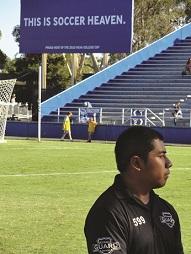

Sometimes, though, a game changer is something that makes us stop and rethink things in a much larger sense. The bombings at the Boston Marathon were a gamer changer in every way. Not only did they influence the race itself and have catastrophic effects on the lives of those in the area at the time, but they continue to affect the way we view our personal safety at sports events.
It’s not unheard-of for one incident to completely change our perspective. Something similar happened after September 11 – we suddenly became very aware of our vulnerability when we travel. The industry responded by creating much more intensive screening processes. Looking back on it, we might have found some measures a bit overzealous, but in many cases, airport security is a work in progress and it continues to evolve.
Sports event security likewise continues to change. Starting with the preseason this year, for example, the NFL will be imposing new restrictions on the things spectators are allowed to carry through the gate. Banned items will include purses larger than a clutch bag as well as coolers, briefcases, backpacks, fanny packs, seat cushions and computer and camera bags.
Are these new rules too stringent? Hard to say. If they keep people safe, then no, they’re not too stringent. If, however, they cause long lines and lots of delays and complaints at the gate, then procedures may have to be re-examined. Only time – and fan reaction – will tell.
 Perhaps one of the most interesting aspects of sports security is that it is always changing. Sometimes, we have current events to thank (or more likely, to blame) for that – but sometimes, other factors make it evolve as well. Something that is continuing to make changes in the security profession is technology.
Perhaps one of the most interesting aspects of sports security is that it is always changing. Sometimes, we have current events to thank (or more likely, to blame) for that – but sometimes, other factors make it evolve as well. Something that is continuing to make changes in the security profession is technology.
This may not be what you think. While closed circuit TV (CCTV) surveillance has been in use for a long time, there are other forms of technology that are making sports safer. Maybe the biggest surprise? They’re spectator-driven.
There’s an App for That
Handheld technology – as readily available as your smartphone – can make a big difference in your event security. You’ve probably been to sports events and seen messages flashed on the JumboTron, asking you to send a text to a specific number to be entered in a drawing to win something, to contribute to a charity or to be notified of future game schedules. What you might not be aware of is that there is an app for security as well.
Something the security industry is starting to see is widespread use of instant text messaging to report things. These things might include:
- A person acting in a suspicious manner
- A bag someone has left behind that doesn’t seem to have an owner
- An inebriated or confrontational patron
- Two people acting like they’re ready to start a fight, or who are being obnoxious to others
- Or anything else, really, that makes a spectator uneasy
We have seen an uptick in the adoption and use of proprietary software, such as ISS 24/7 (although there are others) that allow patrons to report something anonymously. The current culture of “If you see something, say something” is absolutely a help here. We encourage people to be vigilant, to take action and to be proactive if something is bothering them.
Sometimes, patrons are hesitant to go directly to security, or to call from their seat. Maybe they don’t want to be viewed as paranoid or they don’t want to risk a confrontation with someone. Who can blame them? But these days, rather than remaining silent and having their experience spoiled, spectators can discreetly text a number, report what is going on and security comes in and takes it from there. Mission accomplished. Like we said: a game changer.
 Social Media and the Sports Event Scene
Social Media and the Sports Event Scene
Twitter, Facebook and more are great tools, but they can be a two-edged sword. We want people to use them to express how much fun they are having at an event, but we also know they allow for instant communication to a potentially big audience – something that isn’t always good.
For example, at the 2013 MLB All-Star Game, a fan put up on his Twitter account that if enough people retweeted his message, he’d run onto the field. Sure enough, he got enough response, ran onto the playing field – and was promptly subdued and arrested. Social media fail.
But for every ridiculous episode, we can also point to times when social media has done a great job – such as times when it alerts patrons to the need to evacuate a venue because of a potentially catastrophic or just plain dangerous weather event, such as an oncoming tornado or a violent line of thunderstorms. And in those cases, social media was able to give plenty of warning, and to help spread the word quickly among not just spectators but those at home.
Now a Major Motion Picture
Something else to think about: now that so many people have smartphones with the ability to take photos and video, the ability to capture events is literally in the palm of your hand. Not just great sports performances but good and bad behavior on the part of anyone at the game can be captured and immortalized.
We like to tell guests (and to be honest, everyone involved in security), “Don’t do anything you wouldn’t want to see on YouTube,” and it’s not a joke. Nobody wants to see bad behavior (either on their part or someone else’s part) made into a viral video.
 Other Technology
Other Technology
Two-way radios have been a standard for a long time in security use. And as always, that technology continues to evolve. For a long time, cell phones with radio capability (Nextel is one example, but there are others) were being used. Lately, however, we’re seeing more people using digital radios. The reception is clearer and they’re far more effective than the old analog technology.
Security vs. Efficiency
Creating an atmosphere in which people feel safe and are safe at an event is essential. Just as important is trying to balance that with the need to get everyone through the doors and seated on time. Searching through bags and backpacks as people enter a game or an event may be necessary, but it can lead to complaints. In many cases, people pay a great deal of money to attend an event, and they don’t want to waste time standing in line. If bags have to be inspected before people enter an event, we encourage the organizers to make sure they have enough security personnel at the entrance gates to keep the crowd moving. That way, nobody jeopardizes personal safety at the cost of efficiency.
We have to remember, too, that there are times to think outside the box, or at least outside the safety parameters. If someone is trying to get into a game with a big bag, we have to consider exceptions to the rule. A family traveling with children may need a large diaper bag. If someone has essential medical supplies such as syringes because they have diabetes, they can’t leave those behind. And media representatives often travel with big camera bags, laptops, tablets and more. There will always be exceptions to the rules, and it’s imperative to consider those as well.
Security has meant, and will always mean, a professional presence that keeps an event safe. Now, thanks to technology, it’s even safer. And that’s a game changer we can all live with.

